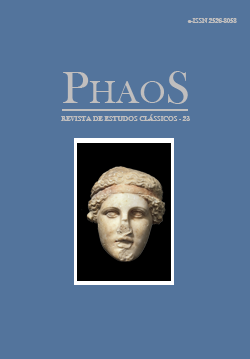Abstract
The aim of this paper is to analyse Ovid’s elegy Tristia 5.3, in which he writes to the college of poets on the occasion of the Liberalia, sometimes directly addressing the god Bacchus to ask for his help and to put an end to his relegatio to distant Tomi. The fact that he addresses and invokes Bacchus and not the “god” Augustus, who ordered the Ovidian exile, has led critics to conjecture a veiled attack on the princeps. We will show, however, that the proximity to Bacchus is more an attempt to defend his poetry and affirm his work as a poet than a direct affront to the princeps. Moreover, it contributes to the construction of their profile as vates. To this end, we will first focus on examining the form and content of the poem. Then, we will discuss different positions that see in this elegy an affront to Augustus. Finally, we will offer our argument against such positions by pointing out that Ovid’s association with Bacchus as protector of the poets is congruent with the mention of the Bacchica serta (Tr. 1.7.2), which crowns the poet at the beginning of the Tristia.
References
AVELLAR, J. Deuses de papel e de poesia: o hino a Baco na elegia 5.3 dos Tristia. In: PENNA, H.; AVELLAR, J.; CARVALHO, R. Deus(es) na literatura. Relicário, 2018, p. 101-109.
AMANN, M. Komik in den Tristien Ovids. Basel: Schwabe, 2006.
ARMSTRONG, R. Retiring Apollo: Ovid on the Politics and Poetics of Self-Sufficiency. Classical Quarterly, 54, p. 528-50, 2004.
BAEZA ANGULO, E. Ovidio. Tristezas. Introducción, edición crítica y traducción, Madrid: Alma Mater, 2005.
BRETZIGHEIMER, G. Exul ludens. Zur Rolle von relegans und relegatus in Ovids. Gymnasium, Heidelberg, 39-76, 1991.
CLAASSEN, J. M. Displaced Persons: The Literature of Exile from Cicero to Boethius. London: Duckworth, 1999.
COMMAGER, S. The Odes of Horace. A critical Study. Norman; London: The University of Oklahoma Press, 1962.
DOWLING, M. Clemency and cruelty in the Roman world. Ann Harbor: The University of Michigan Press, 2006.
GAERTNER, J. F. Ovid, Epistulae ex Ponto, Book 1. Oxford Classical Monographs, Oxford: Oxford University Press, 2005.
GALASSO, L. The Ars poetica of Horace in Ovid’s exile poetry. Materiali e discussioni per l'analisi dei testi classici, n. 72, New Approaches to Horace’s Ars poetica, p. 193-205, 2014.
HARDIE, A. A dithyramb for augustus: Horace, odes 4.21. The Classical Quarterly, n. 65, 1, p. 253 – 285, 2015.
HARRISON, S. Horace’s hymn to Bacchus (Odes 2.19): poetics and politics”. In MARTINS, P.; HASEGAWA, A.; OLIVA NETO, J.A. Augustan poetry. New trends and revaluations. São Paulo: Humanitas, 2019, p. 231-252.
HASEGAWA, A. P. A poesia lírica de Horácio. Estadão-Estado da arte, São Paulo, 18/11/2018. https://estadodaarte.estadao.com.br/a-poesia-lirica-de-horacio/
INGLEHEART, J. A. Commentary on Tristia Book II. Oxford: Oxford University Press, 2010.
INGLEHEART, J. Ovid, the Error and the Theme of Sight in Tristia 2. Materiali e discussioni per l'analisi dei testi classici, n. 56, p. 63-86, 2006.
LOWRIE, M. Writing, Performance, and Authority in Augustan Rome. Oxford: Oxford University Press, 2009.
MCGOWAN, M. Ovid in Exile. Power and Poetic Redress in the Tristia and Epistulae ex Ponto. Leiden-Boston: Brill, 2009.
MILLER, J. Ovid and Augustan Apollo. Hermathena, n. 177/178, p. 165-180, 2005.
MILLER, J. Bacchus and the exiled Ovid (Tristia 5.3). In: MAC GÓRÁIN, F. Dionysus and Rome: Religion and Literature, Berlin, Boston: De Gruyter, 2020, p. 177-192.
NAGLE, B. R. Ovid's Fasti: Roman Holidays. Bloomington-Indianapolis: Indiana University Press, 1995.
NEWMANN, J. K. The concept of Vates in Augustan poetry. Bruxelles: Latomus, Revue d'études latines, 1967.
NICOLL, W. S. M. Cupid, Apollo, and Daphne (Ovid, Met. 1. 452 ff.). The Classical Quarterly, v. 30, n. 1, p. 174-182, 1980.
OWEN, S.G. Ovid, Tristia, Boook I. Oxford: Clarendon Press, 1889.
PRATA, P. Tristes II de Ovídio: um pedido a Augusto. Aisthe, v. 3 n. 4: A Poética das Emoções, p. 38-53, 2009.
SCHIESARO, A. Horace’s Bacchic Poetics. In: HOUGHTON, L.B.T.; WYKE, M. (eds) Perceptions of Horace. A Roman poet and His Readers. Cambridge: Cambridge University Press, 2009, p. 61-79.
SERIGNOLLI, L. Bacchus, Augustus and the poet in Horace Odes 3.25. In MARTINS, P.; HASEGAWA, A.; OLIVA NETO, J.A. Augustan poetry. New trends and revaluations. São Paulo: Humanitas, 2019, p. 275-308.
SUBIAS-KONOFAL, V. Poésie, politique et rhétorique rituelle: l'Hymne à Germanicus. Bulletin de l'Association Guillaume Budé, n°1, p. 107-129, 2003.
UGARTEMENDÍA, Cecilia Marcela. Ille ego Romanus vates. A autoridade poética do relegatus nos Tristia e nas Epistulae ex Ponto, de Ovídio. 2022. 246 p. Tesis (Doutorado em Letras Clássicas) – Faculdade de Filosofia, Letras e Ciências Humanas da Universidade de São Paulo, São Paulo, 2022.
ZANKER, P. Augustus und die Macht der Bilder. Munich: C.H. Beck, 1987.

This work is licensed under a Creative Commons Attribution-NonCommercial-ShareAlike 4.0 International License.
Copyright (c) 2023 Creative Commons


